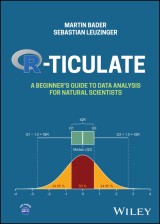Details
R-ticulate
A Beginner's Guide to Data Analysis for Natural Scientists1. Aufl.
|
92,99 € |
|
| Verlag: | Wiley |
| Format: | |
| Veröffentl.: | 02.07.2024 |
| ISBN/EAN: | 9781119718000 |
| Sprache: | englisch |
| Anzahl Seiten: | 224 |
DRM-geschütztes eBook, Sie benötigen z.B. Adobe Digital Editions und eine Adobe ID zum Lesen.
Beschreibungen
<p><b>An accessible learning resource that develops data analysis skills for natural science students in an efficient style using the R programming language</b> <p><i>R-ticulate: A Beginner’s Guide to Data Analysis for Natural Scientists </i>is a compact, example-based, and user-friendly statistics textbook without unnecessary frills, but instead filled with engaging, relatable examples, practical tips, online exercises, resources, and references to extensions, all on a level that follows contemporary curricula taught in large parts of the world. <p>The content structure is unique in the sense that statistical skills are introduced at the same time as software (programming) skills in R. This is by far the best way of teaching from the authors’ experience. <p>Readers of this introductory text will find: <ul><li>Explanations of statistical concepts in simple, easy-to-understand language </li><li>A variety of approaches to problem solving using both base R and <i>tidyverse </i></li><li>Boxes dedicated to specific topics and margin text that summarizes key points </li><li>A clearly outlined schedule organized into 12 chapters corresponding to the 12 semester weeks of most universities</li></ul> <p>While at its core a traditional printed book, <i>R-ticulate: A Beginner’s Guide to Data Analysis for Natural Scientists </i>comes with a wealth of online teaching material, making it an ideal and efficient reference for students who wish to gain a thorough understanding of the subject, as well as for instructors teaching related courses.
<p>Preface</p> <p>1 Hypotheses, Variables, Data</p> <p>2 Measuring Variation</p> <p>3 Distributions and Probabilities</p> <p>4 Replication and Randomisation</p> <p>5 Two-Sample and One-Sample Tests</p> <p>6 Communicating Quantitative Information Using Visuals</p> <p>7 Working with Categorical Data</p> <p>8 Working with Continuous Data</p> <p>9 Linear Regression</p> <p>10 One or More Categorical Predictors – Analysis of Variance</p> <p>11 Analysis of Covariance (ANCOVA)</p> <p>12 Some of What Lies Ahead</p>
<p><b>Martin Bader</b> gained an MSc in geography at Saarland University in Germany and an MSc in biology at Waikato University, New Zealand. He earned a PhD in plant ecology at the University of Basel, Switzerland. After post-doctoral stints in Switzerland and Australia he joined the New Zealand Forest Research Institute as a forest ecologist and biostatistician. Following a senior lecturer appointment at Auckland University of Technology, New Zealand, he is now a professor of forest ecology at Linnaeus University, Sweden. He has taught undergraduate and postgraduate courses in statistics at universities and research institutes in various parts of the world. His research focuses on the physiological responses of plants to climate change and their biotic interactions. <p><b>Sebastian Leuzinger </b> did his first degree in marine biology at James Cook University, Australia, with a postgraduate degree in statistics (University of Neuchatel, Switzerland) and a PhD in plant ecology (University of Basel, Switzerland). He has done post-doctoral studies at ETH Zurich, Switzerland, in forest ecology and modelling before joining Auckland University of Technology where he is a full professor in ecology. He has taught undergraduate and postgraduate statistics for natural scientists for over a decade. His research is on global change impacts on plants, with a special interest in meta-analysis of global change experiments.
<p><b>An accessible learning resource that develops data analysis skills for natural science students in an efficient style using the R programming language</b> <p><i>R-ticulate: A Beginner’s Guide to Data Analysis for Natural Scientists </i>is a compact, example-based, and user-friendly statistics textbook without unnecessary frills, but instead filled with engaging, relatable examples, practical tips, online exercises, resources, and references to extensions, all on a level that follows contemporary curricula taught in large parts of the world. <p>The content structure is unique in the sense that statistical skills are introduced at the same time as software (programming) skills in R. This is by far the best way of teaching from the authors’ experience. <p>Readers of this introductory text will find: <ul><li>Explanations of statistical concepts in simple, easy-to-understand language </li><li>A variety of approaches to problem solving using both base R and <i>tidyverse </i></li><li>Boxes dedicated to specific topics and margin text that summarizes key points </li><li>A clearly outlined schedule organized into 12 chapters corresponding to the 12 semester weeks of most universities</li></ul> <p>While at its core a traditional printed book, <i>R-ticulate: A Beginner’s Guide to Data Analysis for Natural Scientists </i>comes with a wealth of online teaching material, making it an ideal and efficient reference for students who wish to gain a thorough understanding of the subject, as well as for instructors teaching related courses.
Diese Produkte könnten Sie auch interessieren:

Nonparametric Regression Methods for Longitudinal Data Analysis
von: Hulin Wu, Jin-Ting Zhang
Preis: 135,99 €

Statistics and the Evaluation of Evidence for Forensic Scientists
von: Colin Aitken, Franco Taroni
Preis: 103,99 €
-
-
© 2024 media control GmbH
Alle Preise enthalten die gesetzliche Mehrwertsteuer. - AGB
- Impressum
- Datenschutzerklärung
- Kontakt
- FAQ
- Mein Konto
- Home
- Erweiterte Suche
- Widerrufsrecht
- Reader-Software
- Desktop-Ansicht
- Gutschein-Code einlösen
- English

